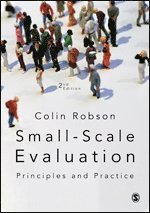
- Format
- Häftad (Paperback)
- Språk
- Engelska
- Antal sidor
- 232
- Utgivningsdatum
- 2017-10-12
- Upplaga
- 2
- Förlag
- SAGE Publications Ltd
- Illustrationer
- Black & white illustrations
- Dimensioner
- 239 x 168 x 13 mm
- Vikt
- Antal komponenter
- 1
- Komponenter
- 467:B&W 6.69 x 9.61 in or 244 x 170 mm (Pinched Crown) Perfect Bound on White w/Matte Lam
- ISBN
- 9781412962483
- 431 g
Small-Scale Evaluation
Principles and Practice
- Skickas från oss inom 7-10 vardagar.
- Fri frakt över 249 kr för privatkunder i Sverige.
Passar bra ihop
De som köpt den här boken har ofta också köpt Once Upon A Broken Heart av Stephanie Garber (häftad).
Köp båda 2 för 764 krKundrecensioner
Fler böcker av Colin Robson
-
How to do a Research Project
Colin Robson
Written specifically to address the needs and concerns of the undergraduate, this tightly focused volume guides students through the process of conducting and completing a research project. Friendly and accessible, this fully-updated second editio...
-
Real World Research
Colin Robson
Provides students and practitioner alike with clear and systematic guidance on performing social research in applied settings Real World Research supplies the multidisciplinary skills necessary to conduct social research projects inside and outsid...
Recensioner i media
A masterfully written text making complex issues approachable and very workable! Robson’s personable style as if engaged in a conversation with the reader entices and enlightens. It is rare to find a text that to such an extent combines user-friendliness and an engaging style without compromising scientific stringency, ethics or practical usefulness and common sense. This is indeed a treasure trove for students and professionals of any kind and everywhere whose study or work involves people in groups and organisations in need of development, change or just a healthy reality check on how their organisation is doing.
This is a marvelous book. It communicates clearly and directly to the reader, making the subject accessible and usable rather than abstruse or forbidding. Robson excels in thinking with the reader and getting the reader to think along with him, so that reading his work seems like collaborating with a helpful mentor. Supported by many helpful diagrams and charts, he uses real-world situations, contexts, examples, and research literature to give the reader an understanding of how she might go about conducting actual research using this book as a guide. He discusses the challenges a researcher can face in conducting evaluations, such as getting those being studied to collaborate in the research project, and the strengths and weaknesses, benefits and pitfalls of so doing. And it is of great value that his focus is specifically on small-scale evaluation, because that is the type of evaluation in which a student or budding researcher is most likely to be involved. Robson is a great demystifier and guide--other research texts would benefit greatly from adopting Robson's style of thinking, writing, and guiding.
Övrig information
Colin Robson is an Emeritus Professor in the School of Human & Health Sciences at the University of Huddersfield. He directed a series of local, regional and national research and evaluation projects, mainly in aspects of special educational needs, at Huddersfield in association with the Hester Adrian Research Centre, University of Manchester. He subsequently was a supervisor for over twenty research students, mainly at Doctoral level, covering a wide range of disciplines - education, social work, management, music, and aspects of health, including nursing, midwifery and osteopathy, while developing and leading a postgraduate programe in Social Research and Evaluation. More recently he was, for over a decade, chief Consultant at the Centre for Educational Research and Innovation at OECD in Paris, for projects evaluating and comparing national systems for the education of students with disabilities, learning and behavioural difficulties and social disadvantages, and a follow-up project for Eurostat, the statistical arm of the European Union.
Innehållsförteckning
Chapter 1: Introduction Who is the book for? What do you need to be able to carry out an evaluation? Evaluation research Small-scale evaluation research The literature search The Internet Using the book A note on 'Tasks' Chapter 2: Evaluation: The What and the Why What is evaluation? Why evaluate? Evaluation and social research What do they think they want? What are they going to find credible? Chapter 3: The Advantages of Collaboration Stakeholders Other models of involvement Using consultants Persuading others to be involved When is some form of participatory evaluation indicated? Chapter 4: Evaluation Designs Different approaches to evaluation Needs assessment Outcome evaluation Process evaluation Combining process and outcome approaches Formative and summative evaluation Efficiency evaluation Reviews Program monitoring Theory-based evaluation An interim summing up Chapter 5: Designing Your Evaluation Reviewing the 'literature' Research questions Methods of data collection Data quality Sampling Prespecified and emergent designs Doing a shoe-string evaluation Chapter 6: Ethical and Political Considerations Ethical issues The problem of unintended consequences Evaluations involving children and other vulnerable populations Ethical issues in online research Ethical boards and committees The politics of evaluation Chapter 7: Practicalities Time budgeting Gaining access Getting organized Getting help and support Chapter 8: Dealing with the Data Coding data Analysis and interpretation of quantitative data Analysis and interpretation of qualitative data Chapter 9: Communicating the Findings Evaluation reports Facilitating the implementation of evaluation findings Chapter 10: Taking it further Further reading Postscript Appendix A: Chapter Tasks Appendix B: Simple Evaluations
Du kanske gillar
-
Animal Farm
George Orwell
Häftad -
Hillbilly Elegy
J D Vance
Häftad -
Source Code
Bill Gates
Inbunden -
The Way Home
Mark Boyle
Häftad


